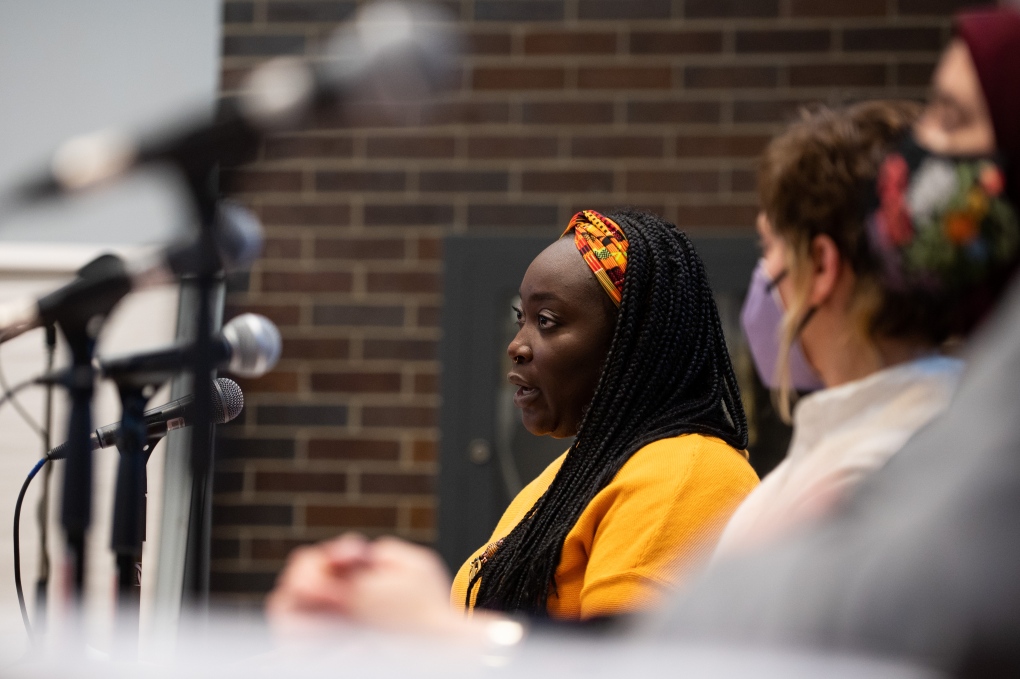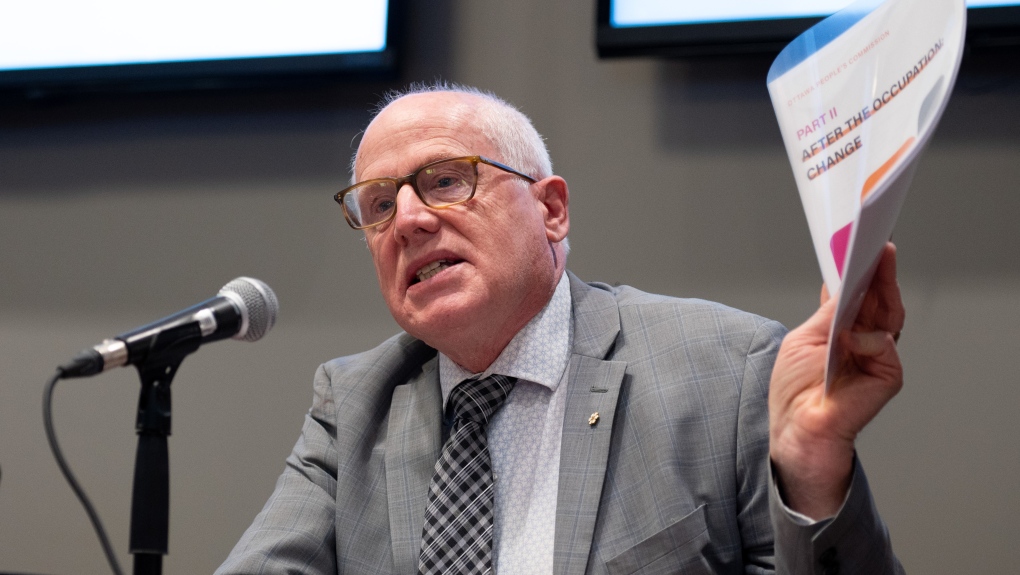'Freedom Convoy' victims deserve apology, compensation, people's commission recommends
Another report detailing the effects that the 2022 "Freedom Convoy" had on the residents of Ottawa has been released, making recommendations to various levels of government to prevent similar incidents and improve trust between residents and officials.
The Ottawa People's Commission on the Convoy Occupation (OPC), which describes itself as a grassroots effort to promote healing and justice after the convoy protest in January and February 2022, has already released one report into the impact of the protest that occupied downtown Ottawa last year. The OPC is a program of Centretown Community Health Centre.
- Download our app to get local alerts to your device
- Get the latest local updates right to your inbox
The first report accused all three levels of government of failing to uphold the human rights of people who live and work in downtown Ottawa.
The second report includes 25 recommendations for government leaders, ranging from local initiatives in Ottawa to broad-reaching recommendations to all three levels of government.
"While there are those who suggest the community should 'move on' and 'get over it', OPC believes it is essential and urgent that the City of Ottawa and other governments provide a substantive — indeed transformative — response, acknowledging the failures, redressing the harms and taking actions that build assurance that the shambolic response to the convoy occupation will never be repeated," the report says.
The 25 recommendations made in the report fall under eight categories: earn trust; uphold the rights of Indigenous peoples; protect human rights; prioritize support for disadvantaged and vulnerable groups; keep the community safe; strengthen emergency response; address hate, build community and advocate inclusion; and ensure accurate follow-up.
"Having both former and also current city councilors involved, I think is indicative that people really care and really want to see some changes because the city not only dealt with this on our own here within the borders of Ottawa, but this rippled across the country and it rippled internationally," said Debbie Owusu-Akyeeah, one of the members of the OPC. "And I think if there are decision makers who don't care, they absolutely should. And I think again, this report is an important documentation as to why."
The report also includes a suggested timeline for its recommendations, ranging from June 30, 2023 to June 30, 2024.
 Ottawa People's Commission on the Convoy Occupation (OPC) Commissioner Debbie Owusu-Akyeeah speaks during a news conference following the release of the second part of the OPC report, titled "After the Occupation: Change", in Ottawa, on Tuesday, April 4, 2023. (Spencer Colby/THE CANADIAN PRESS)
Ottawa People's Commission on the Convoy Occupation (OPC) Commissioner Debbie Owusu-Akyeeah speaks during a news conference following the release of the second part of the OPC report, titled "After the Occupation: Change", in Ottawa, on Tuesday, April 4, 2023. (Spencer Colby/THE CANADIAN PRESS)
The recommendations range in focus and scope from calling on the city to host town hall meetings with downtown residents by the end of June to give officials a first-hand account of residents' experiences to asking for compensation for expenses, lost wages and income, business losses and other financial costs incurred as a result of the convoy occupation.
"The people realized there were unanswered questions. They very much realized that the communities viewpoint and perspective was not being sought, was not being incorporated into decision making, was not informing police actions. And that felt wrong," said Alex Neve, of the OPC.
Other recommendations include creating a human rights charter for the city, and for the municipal, provincial and federal governments to apologize for the harms the protest caused.
"The majority of recommendations are directed to City Hall, where dramatic, substantive change is urgently needed. Others relate to the Province and federal government, or require the cooperation of all three levels of government," the report states.
 Ottawa People's Commission on the Convoy Occupation (OPC) Commissioner Alex Neve speaks during a news conference following the release of the second part of the OPC report, titled "After the Occupation: Change", in Ottawa, on Tuesday, April 4, 2023. (Spencer Colby/THE CANADIAN PRESS)
Ottawa People's Commission on the Convoy Occupation (OPC) Commissioner Alex Neve speaks during a news conference following the release of the second part of the OPC report, titled "After the Occupation: Change", in Ottawa, on Tuesday, April 4, 2023. (Spencer Colby/THE CANADIAN PRESS)
"Some recommendations require immediate action. Others will take more time and more active engagement with residents, community organizations and agencies, and local business leaders to ensure the response meets the community’s diverse needs. In each instance, we have recommended a timeframe for follow up action."
Rebuilding trust in city institutions and the police service has been a stated goal of both Ottawa mayor Mark Sutcliffe and police chief Eric Stubbs.
The first report, titled "What We Heard", compiled the experiences of residents who live in downtown Ottawa. It heard from more than 200 people who endured the three-week long event, which began ostensibly as a protest against COVID-19 public health mandates and the federal Liberal government, but became entrenched as an occupation of downtown streets, as protesters blocked road, set up their own structures and supply chains, and refused to leave.
Jean Christie, a Centretown resident, described her experiences during the protest in 2022.
"To walk across that intersection, I felt like I was moving into somebody else's territory, you know," Christie said. "The honking vehicles were awful. The diesel fumes were awful. And there were a whole lot of places I just simply didn't go because it was too unpleasant. So my question was, how did it get to this before something happened? That was really my concern. How on earth did we get to this place?"
The Freedom Convoy protest in Ottawa inspired numerous similar vehicle-based protests across Canada and around the world in 2022, including at some Canada-U.S. border crossings, to denounce government-imposed mandates to protect the public health of citizens from the COVID-19 pandemic. It also led to the first-ever invocation of the Emergencies Act in Canadian history. A federal commission that examined the use of the act—something required by law when the emergency powers are invoked—found that the government met the threshold to use the Emergencies Act, though commissioner Paul Rouleau expressed his reluctance with the finding.
On Monday, federal court heard from the Canadian Civil Liberties Association and other groups and individuals, who argued that the Trudeau government lacked sound statutory grounds to invoke the emergency measures. The government has argued that the court case should not proceed because the powers are no longer in effect.
--With files from CTV News Ottawa's Dave Charbonneau.
Ottawa People’s Commission Part II - After The Occupation: Change
CTVNews.ca Top Stories

Trudeau talks border, trade in surprise dinner with Trump at Mar-a-Lago
Prime Minister Justin Trudeau discussed border security and trade during a surprise dinner with U.S.-president elect Donald Trump at Mar-a-Lago in West Palm Beach, Fla. on Friday evening, according to senior government sources.
Man who died trying to help stranded motorist identified as Khalid Farooq, father of 5
The man who lost his life trying to help a stranded motorist Wednesday has been identified as Khalid Farooq.
W5 Investigates 'I never took part in beheadings': Canadian ISIS sniper has warning about future of terror group
An admitted Canadian ISIS sniper held in one of northeast Syria’s highest-security prisons has issued a stark warning about the potential resurgence of the terror group.
Are scented candles bad for you? What the science says
Concerns about the safety of candles are rooted in the chemical reactions that occur when you burn them, as well as in the artificial fragrances and colorants that contribute to the various scents you may love.
Premier League trophy in Toronto as Man City visits Liverpool in high-stakes showdown
Manchester City's Premier League title hopes could hang in the balance Sunday when the slumping club visits league-leading Liverpool.The trophy they are both battling for is 5,450 kilometres away — in Toronto.
Why this Toronto man ran so a giant stickman could dance
Colleagues would ask Duncan McCabe if he was training for a marathon, but, really, the 32-year-old accountant was committing multiple hours of his week, for 10 months, to stylistically run on the same few streets in Toronto's west end with absolutely no race in mind. It was all for the sake of creating a seconds-long animation of a dancing stickman for Strava.
It's time for a good movie this holiday season, here's what's new in theatres
This holiday season has a special edition at the theatres with movies "that everyone has been waiting for," says a movie expert from Ottawa.
Poilievre suggests Trudeau is too weak to engage with Trump, Ford won't go there
While federal Conservative Leader Pierre Poilievre has taken aim at Prime Minister Justin Trudeau this week, calling him too 'weak' to engage with U.S. president-elect Donald Trump, Ontario Premier Doug Ford declined to echo the characterization in an exclusive Canadian broadcast interview set to air this Sunday on CTV's Question Period.
Emboldened 'manosphere' accelerates threats and demeaning language toward women after U.S. election
An emboldened “manosphere” has seized on Republican Donald Trump ’s presidential win to justify misogynistic derision and threats online.































